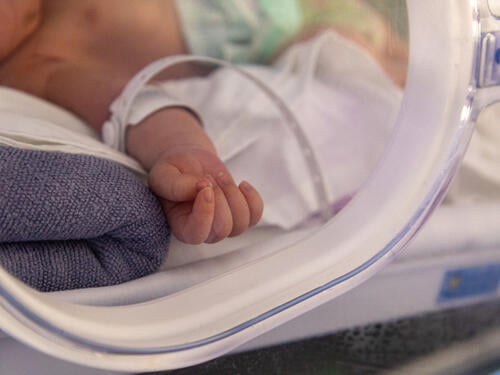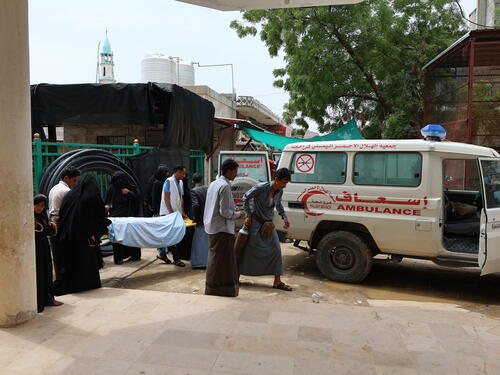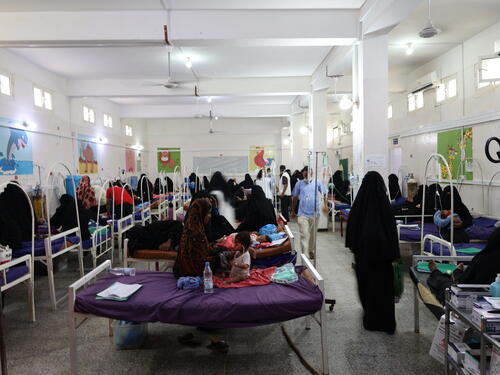Nogood is lying under the covers of her bed, exhausted. She's resting her left hand on her belly while she draws long, slow breaths. Meanwhile, her one-day-old son, Ahmed, is sleeping next to her.
Nogood was admitted to the post-operative ward after delivering Ahmed through caesarean section at the maternity unit at the Al-Jamhouri hospital, in Taiz city, Yemen. Médecins Sans Frontières (MSF) has been running the maternal and neonatal services at the hospital in collaboration with the Ministry of Health (MoH) since May 2021.
Our teams provide technical support and financial incentives to the MoH staff, as well as medical and logistical supplies to run the maternity unit, including services such as caesarean sections, antenatal and postnatal care, family planning, vaccination and neonatal care.
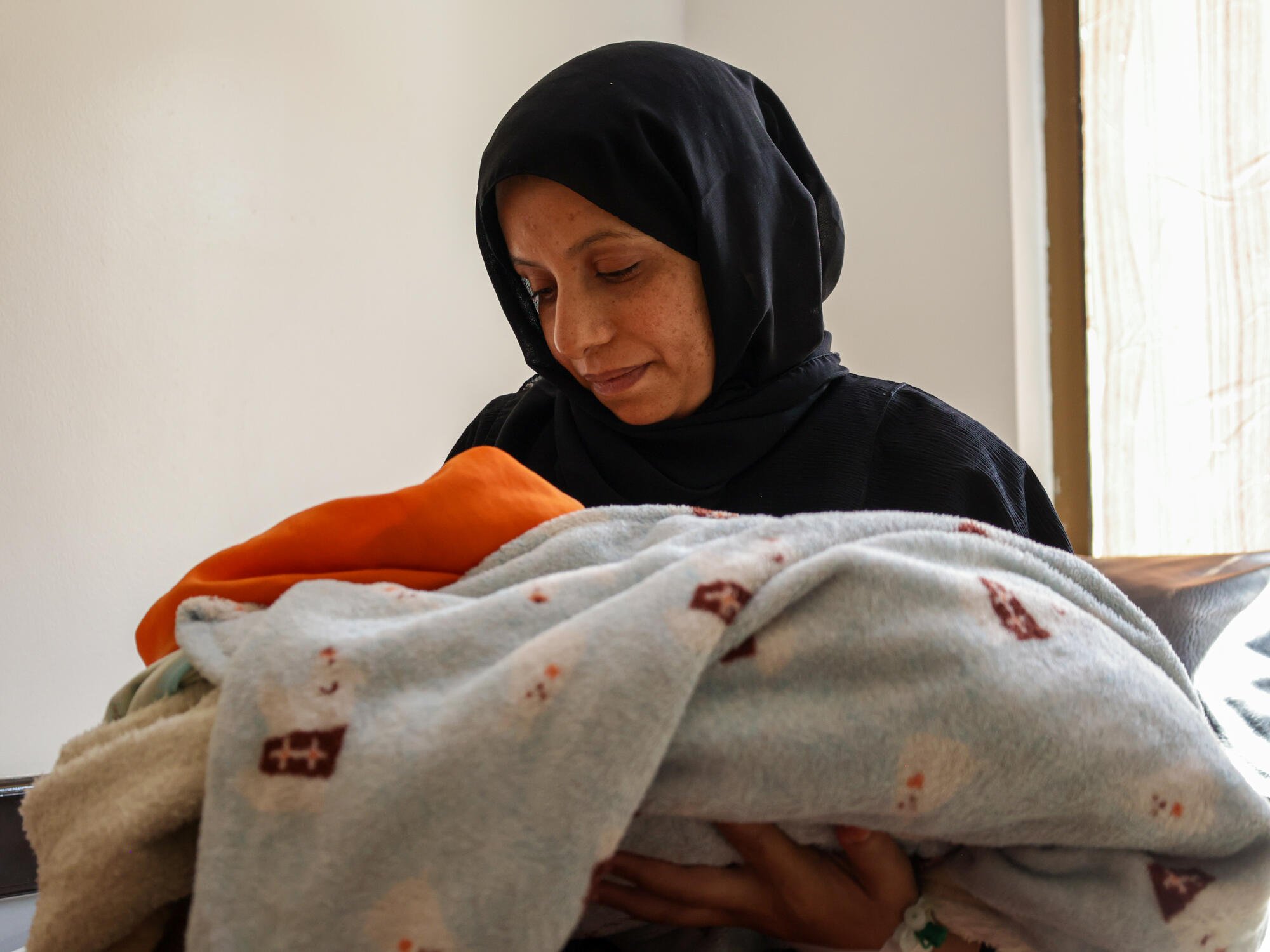
Supporting Al-Jamhouri Hospital
A nearly-collapsed health system
More than eight years of war in Yemen have taken a devastating toll on people, affecting their ability to reach quality and timely healthcare. Less than 50 per cent of healthcare structures are still functioning in Yemen.
Since 2016, healthcare workers haven’t been paid monthly salaries on a regular basis, forcing many to find alternative employment to make a living. This situation drives people to seek free healthcare in the closest possible area – a task that is not always easy.
Like Nogood, many women travel long distances to deliver their babies at Al-Jamhouri hospital. “I come from Bani Oman village,” says Nogood. “My financial situation is not good, so I came to Al-Jamhouri hospital to have my caesarean section, because it is free of charge. There is only one health centre in the village, but the necessary equipment is not available there,” she says.
“It took me two hours to get here,” says Bushra*, who is eight months pregnant. Bushra’s brother brought her to the hospital for emergency medical care from Sabr Al Shaqeb area. “We live on a mountain, so after the rain the road becomes worse and worse. I was in pain and due to the arduous journey, I became so unwell,” she says.
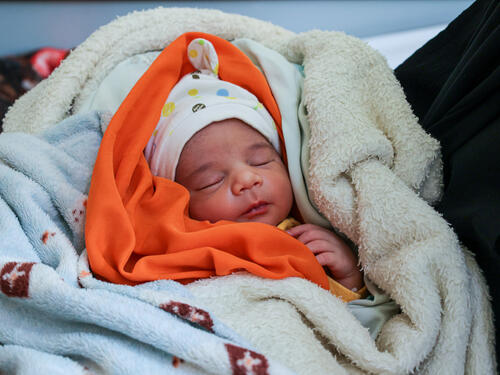
After years of fighting, Taiz governorate remains divided between Taiz city, controlled by the administration of the internationally-recognised government of Yemen, and the suburb of the city Al-Houban, the Ansar Allah-controlled part of Taiz.
The frontline that runs through the city is littered with landmines and guarded by snipers, forcing people to make the long, perilous journey through the mountains. To access free, quality healthcare at Al-Jamhouri hospital, people living in Al-Houban need to travel between five to eight hours.
Pregnant women living in rural areas reach the hospital with high risk and/or complicated pregnancies. These cases could be avoided but for a lack of consistent antenatal and postnatal care. Between August 2021 and August 2022, our teams in Al-Jamhouri hospital assisted 6,739 deliveries, out of which almost 29 per cent were caesarean sections.
“The first time that I had pain I went to a doctor in my area and they just gave me first aid,” says Bushra. “There was no equipment or machines and that’s the only thing they were able to do.”
According to Mduduzi Chandawila, the MSF medical team leader in Taiz city, most of the women who come to Al-Jamhouri hospital from remote locations have rarely received antenatal care. “It’s a challenge,” says Chandawila. “Some of the high-risk pregnancies that come to antenatal care here in Al-Jamhouri hospital are coming for the first time. Some of them are already in their eighth or ninth month of pregnancy.”
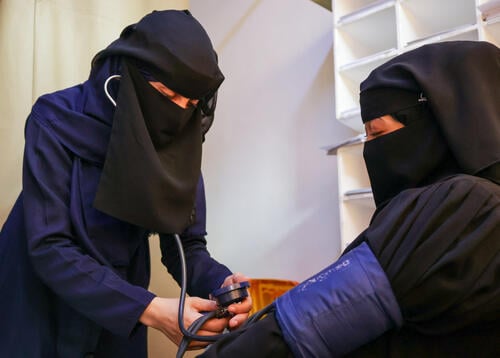
Lack of community health promotion
The lack of health promotion related to antenatal and postnatal care, which can be lifesaving, also gravely impacts pregnant women and puts their lives and their babies’ lives at risk.
“Most of the women attending our services, for antenatal care for example, are presenting late or they are patients who are at high-risk,” says Chandawila.
An MSF team conducts health promotion activities to spread awareness about the importance of antenatal and postnatal care in the maternity ward and through broader community outreach.
“Through antenatal care, health conditions can be identified earlier. We are able to offer the best mode of delivery, identify what support the women need, as well as what medication or treatment is required before they deliver,” says Chandawila.
“Postnatal care is also very important so that we can monitor the progress of the post-delivery period. We can monitor the surgical side, infections and other complications that may develop.”
Some of the high-risk pregnancies that come to antenatal care here in Al-Jamhouri hospital are coming for the first time. Some of them are already in their eighth or ninth month of pregnancy.Mduduzi Chandawila, MSF medical team leader in Taiz city
The maternity unit at Al-Jamhouri hospital assists approximately 520 deliveries per month. After our teams began supporting the maternity unit, there was a sharp reduction in neonatal mortality rate and an increase in antenatal and postnatal consultations.
Between August 2021 and August 2022, neonatal mortality rate decreased from approximately 24 per cent to 10 per cent. Antenatal and postnatal consultations also increased. In August 2021, our teams conducted 1,364 antenatal consultations and 86 postnatal consultations, while in August 2022, these numbers rose to 1,795 and 527, respectively.
While these numbers are encouraging, serious gaps remain. Timely access to basic healthcare remains a challenge, especially for pregnant women whose pregnancies should be regularly monitored early on to avoid medical complications and prevent maternal and neonatal deaths.
*name changed to protect identity




